Unit 1 Me and My Class.Lesson 3 Getting to Know You!课件(共13张PPT)
文档属性
| 名称 | Unit 1 Me and My Class.Lesson 3 Getting to Know You!课件(共13张PPT) |
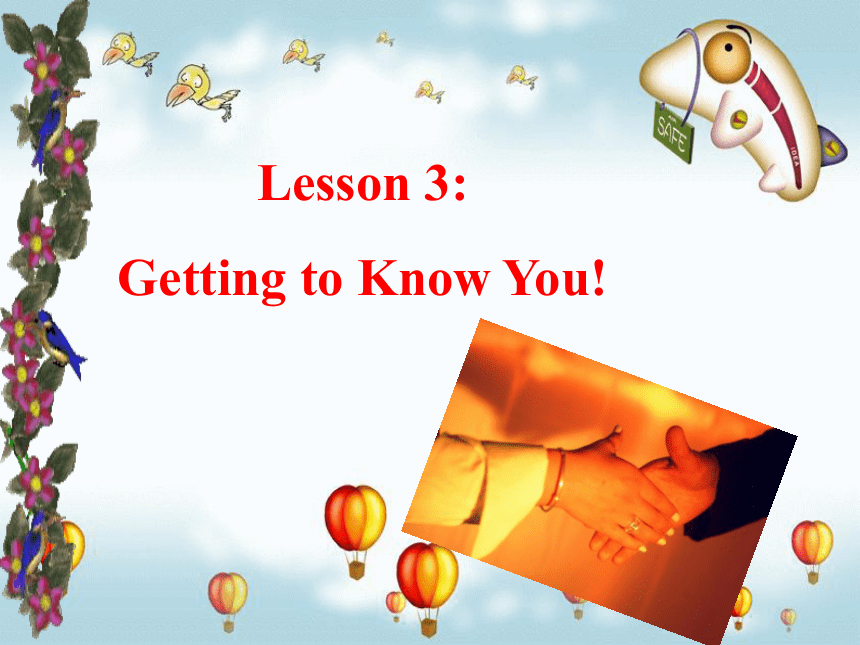
|
|
| 格式 | ppt | ||
| 文件大小 | 612.5KB | ||
| 资源类型 | 教案 | ||
| 版本资源 | 冀教版 | ||
| 科目 | 英语 | ||
| 更新时间 | 2022-05-31 22:15:42 | ||
图片预览

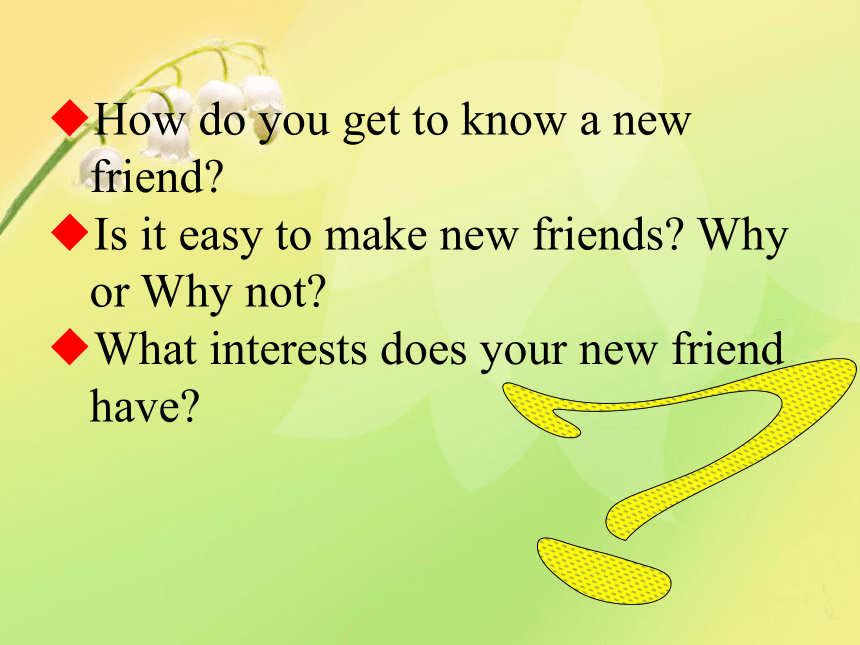
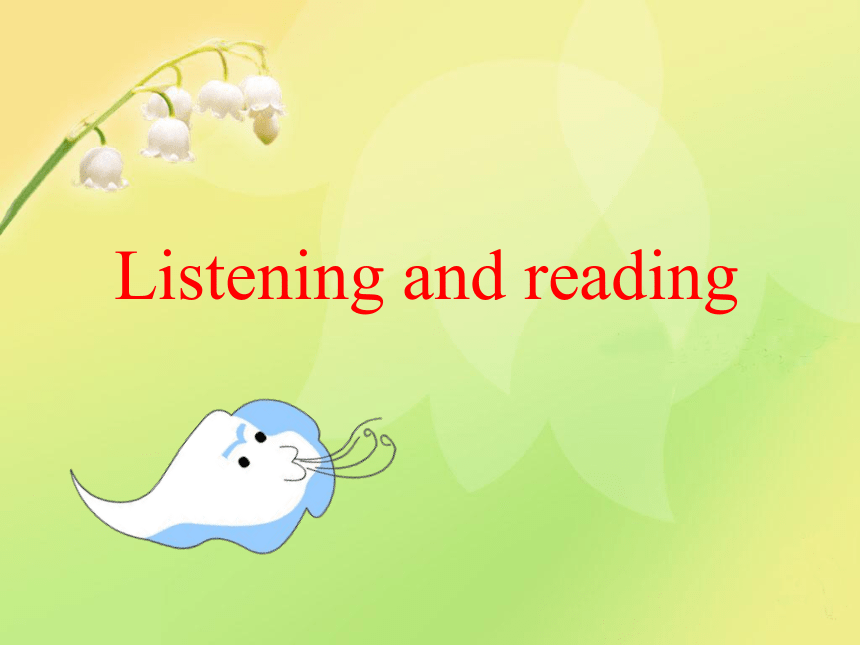

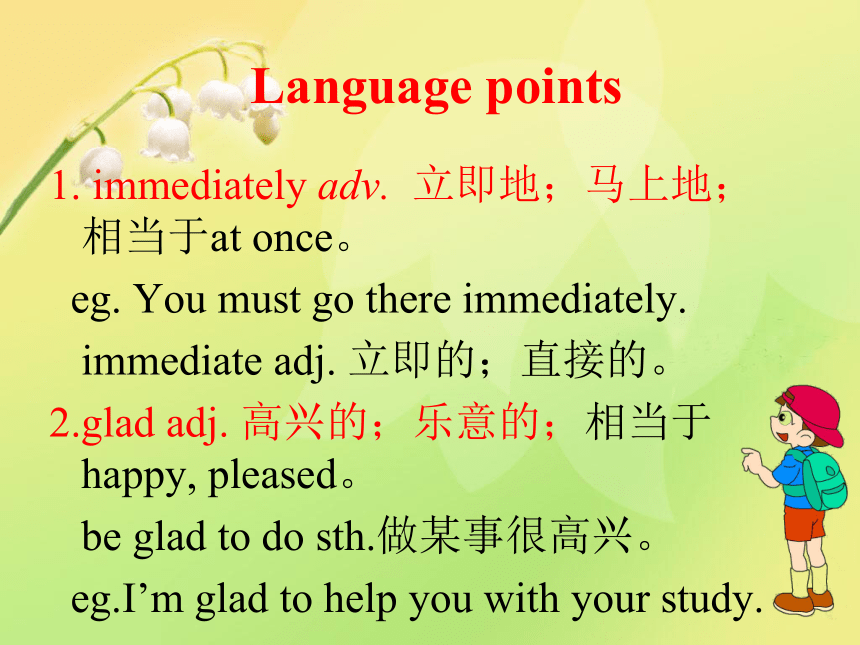
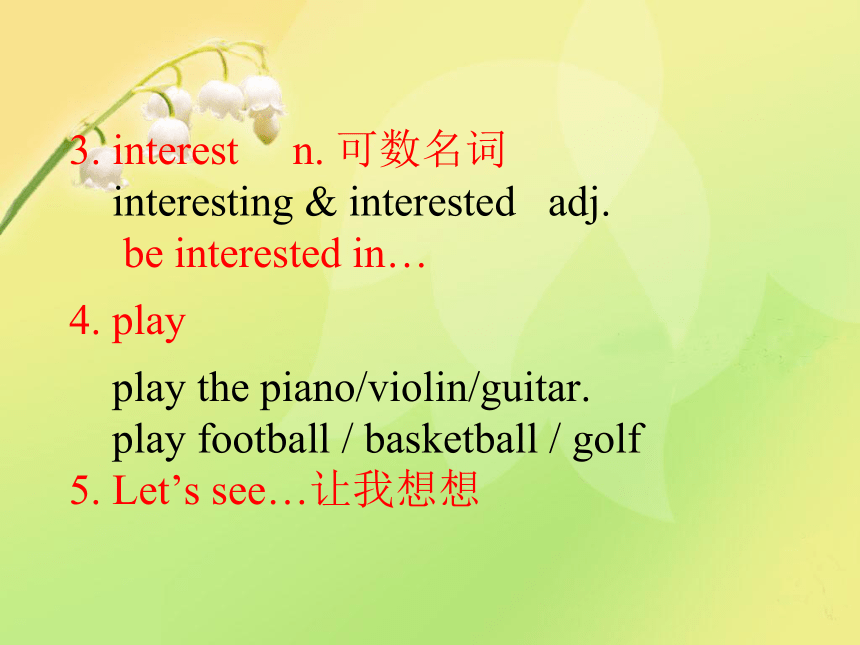
文档简介
(共13张PPT)
Lesson 3:
Getting to Know You!
◆How do you get to know a new friend
◆Is it easy to make new friends Why or Why not
◆What interests does your new friend have
Listening and reading
◆Why is Danny scared
◆Do you think Danny and Sandra will become good friends Why
◆What does Sandra dislike
Because Sandra is a new student.
Yes. They like the same colour and foods. They don’t like rain.
He doesn’t like to comb his hair and get out of bed sometimes.
Language points
1. immediately adv. 立即地;马上地;相当于at once。
eg. You must go there immediately.
immediate adj. 立即的;直接的。
2.glad adj. 高兴的;乐意的;相当于happy, pleased。
be glad to do sth.做某事很高兴。
eg.I’m glad to help you with your study.
3. interest n. 可数名词
interesting & interested adj.
be interested in…
4. play
play the piano/violin/guitar.
play football / basketball / golf
5. Let’s see…让我想想
6. hate与dislike
用法区别:hate to do/doing sth.
dislike doing sth.
e.g. I hate to do / doing my homework.
I dislike doing my homework.
7. go for walks = go for a walk
8. get out of bed = get up
9. one more = another “另一个”
two more = another two “另两个”
Please give me three more pears.
Please give me another three pears.
10. either, also, too区别
either 否定句句尾,前面加逗号。
too 肯定/疑问句句尾,前面加逗号。
also 肯定句句中,be动词/助动词/情态动词
之后,行为动词之前。
用 either, also, too填空
1. He doesn’t know the answer, ______.
2. I’m a driver. She is a driver, _____.
3. I can swim. She ______ can swim.
either
too
also
用in, about, for, to填空
1. They have Miss Fan ____ English class.
2. Everyone reads and writes ____ English class.
3. The English teacher wants me to talk ________ my classmates.
4. I want you to write _________ them.
for
in
to/about
to/about
Activity: Make an interview chart
What do they…
Names Love(to do) Hate(to do)
Jenny
Danny
Brian
This is my friend, …
He/She loves/likes …
He/She hates to …
Lesson 3:
Getting to Know You!
◆How do you get to know a new friend
◆Is it easy to make new friends Why or Why not
◆What interests does your new friend have
Listening and reading
◆Why is Danny scared
◆Do you think Danny and Sandra will become good friends Why
◆What does Sandra dislike
Because Sandra is a new student.
Yes. They like the same colour and foods. They don’t like rain.
He doesn’t like to comb his hair and get out of bed sometimes.
Language points
1. immediately adv. 立即地;马上地;相当于at once。
eg. You must go there immediately.
immediate adj. 立即的;直接的。
2.glad adj. 高兴的;乐意的;相当于happy, pleased。
be glad to do sth.做某事很高兴。
eg.I’m glad to help you with your study.
3. interest n. 可数名词
interesting & interested adj.
be interested in…
4. play
play the piano/violin/guitar.
play football / basketball / golf
5. Let’s see…让我想想
6. hate与dislike
用法区别:hate to do/doing sth.
dislike doing sth.
e.g. I hate to do / doing my homework.
I dislike doing my homework.
7. go for walks = go for a walk
8. get out of bed = get up
9. one more = another “另一个”
two more = another two “另两个”
Please give me three more pears.
Please give me another three pears.
10. either, also, too区别
either 否定句句尾,前面加逗号。
too 肯定/疑问句句尾,前面加逗号。
also 肯定句句中,be动词/助动词/情态动词
之后,行为动词之前。
用 either, also, too填空
1. He doesn’t know the answer, ______.
2. I’m a driver. She is a driver, _____.
3. I can swim. She ______ can swim.
either
too
also
用in, about, for, to填空
1. They have Miss Fan ____ English class.
2. Everyone reads and writes ____ English class.
3. The English teacher wants me to talk ________ my classmates.
4. I want you to write _________ them.
for
in
to/about
to/about
Activity: Make an interview chart
What do they…
Names Love(to do) Hate(to do)
Jenny
Danny
Brian
This is my friend, …
He/She loves/likes …
He/She hates to …
同课章节目录
- Unit 1 Me and My Class
- Lesson 1 Back to School!
- Lesson 2 Many Faces, One Picture
- Lesson 3 Getting to Know You!
- Lesson 4 Best Friends
- Lesson 5 Meet Ms. Liu
- Lesson 6 Jenny's Week
- Unit 2 My Favourite School Subject
- Lesson 7 Don't Be Late for Class!
- Lesson 8 E-mail Helpers!
- Lesson 9 I Don't Want to Miss Geography !
- Lesson 10 Looking for Lisa
- Lesson 11 Lily Learns about China !
- Lesson 12 Karen's Hair Stood Up!
- Unit Review
- Unit 3 Families Celebrate Togethe
- Lesson 13 I Love Autumn
- Lesson 14 Happy Memories
- Lesson 15 A Present for Li Ming!
- Lesson 16 Happy Thanksgiving!
- Lesson 17 Presents from Canada!
- Lesson 18 Li Ming's Birthday
- Unit Review
- Unit 4 My Neighbourhood
- Lesson 19 The Best Neighourhood
- Lesson 20 No Stopping!
- Lesson 21 Eat a Donut and Turn Right
- Lesson 22 I Like My Neighbourhood
- Lesson 23 People in My Neighbourhood
- Lesson 24 I Need a Map!
- Unit Review
- Unit 5 My Future
- Lesson 25 I Want to Be a Teacher!
- Lesson 26 What Will I Be ?
- Lesson 27 What's Your Advice?
- Lesson 28 Rich or Poor? It Doesn't Matter!
- Lesson 29 Our Ambitions and Dreams
- Lesson 30 A Famous Friend?
- Unit Review
- Unit 6 Go With Transportation !
- Lesson 31 How Do You Travel ?
- Lesson 32 Trains Go Faster !
- Lesson 33 Life on Wheels
- Lesson 34 Flying Donuts
- Lesson 35 Future Transportation
- Lesson 36 Clean Cars ?
- Unit Review
- Unit 7 Enjoy Your Hobby
- Lesson 37 What's Your Hobby ?
- Lesson 38 Hobbies Are Fun!
- Lesson 39 Danny's Hobby
- Lesson 40 What's Paul's Hobby?
- Lesson 41 Show and Tell!
- Lesson 42 The New Club
- Unit Review
- Unit 8 Celebrating Me
- Lesson 43 What Makes You Unique?
- Lesson 44 Georgia Plays Basketball
- Lesson 45 Be Yourself !
- Lesson 46 My Dream
- Lesson 47 I Made It !
- Lesson 48 Li Ming's Report
- Unit Review
